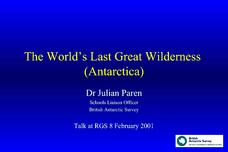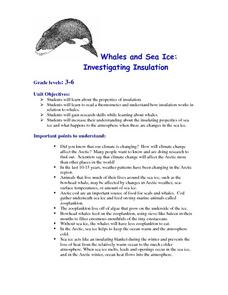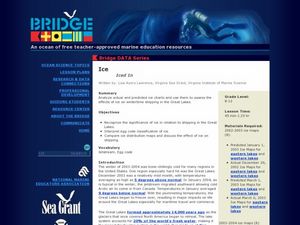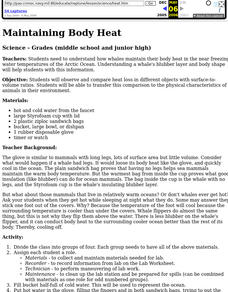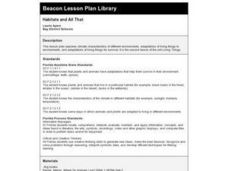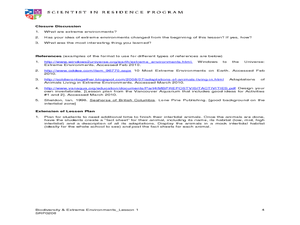Polar Trec
Bioaccumulation of Toxins
In 2015, Peter Cook found that sea lions with high levels of exposure to toxins suffered permanent brain damage if they survived at all. Scholars learn about the accumulation of toxins at various levels of the food chain. Using...
Howard Hughes Medical Institute
Modeling Trophic Cascades
In the ecological game of who eats who, one small change can have a big impact! Individuals create food chains in an array of ecosystems, then determine what happens to organisms in the chain when one organism changes its feeding...
American Museum of Natural History
Moving Mammals
How many different ways do mammals move from place to place? An online resource uses animation to show how different mammals move. Learners use a slider to speed up or slow down a variety of mammals. The versatile lesson works as a...
American Museum of Natural History
Climate Change
It actually is possible to have too much of a good thing when it comes to climate change. A slide show lesson describes how burning fossil fuels contributes to climate change. Individuals read about the scientific process and the...
Curated OER
Oceans of the World
Students compare and contrast information about oceans. They locate the oceans on a globe, and in small groups conduct Internet research on the oceans, identifying the similarities and differences and writing a report.
Curated OER
The Extraordinary Life of the Alaskan Tundra
Students investigate the characteristics of the tundra on the North Slope of Alaska. They conduct Internet research, develop a chart of the types of vegetation, plant growth, and fauna found on the tundra, identify examples in their own...
Curated OER
Weather Olympics
Students consider the effects of topography on climate patterns. In this earth science lesson, students research weather patterns and make inferences of how the land forms may create different climates. Students compare Celsius...
Curated OER
On the Rise . . . Sea Level and Global Warming
Ninth graders conduct an experiment to determine how melting sea ice affect sea level. In this earth science lesson, 9th graders explain the environmental consequences of rising sea level. They relate this lesson to global warming.
Curated OER
The World's Last Great Wilderness (Antarctica)
It's a shame that there are no photographs in this presentation because the information is fascinating! Each identically fashioned slide contains bullet points of information about Antarctica that will enhance an earth science...
Curated OER
Whales and Sea Ice: Investigating Insulation
Young scholars investigate the properties of insulation as it relates to whales and sea ice. They research whales and examine the atmospheric changes that occur when there are changes in sea ice.
Curated OER
Whale Watcher Game Lesson
Students participate in an online whale watching game. They identify the reasons for migration and describe the route. They make predictions on what would happen if the ways did not migrate.
Curated OER
Blending Butterflies
Students create camouflage butterflies. In this camouflage lesson plan, students read about the different types of camouflage. Each student in the class chooses a spot in the classroom and creates a camouflaged butterfly. They hang up...
Curated OER
Climate Change: Is there a Controversy
Students explore climate changes. In this climate changes lesson, students research what causes changes. Students search the Internet, summarize reports they find and create a poster with the information.
Curated OER
Iced In
Introduce junior oceanographers to ice conditions in The Great Lakes. The ice map links are no longer available, so you will not be able to have your class perform the mentioned data activity. You can, however, access the Canadian Ice...
Curated OER
Maintaining Body Heat
Students observe and compare heat loss in different objects with surface-to-volume ratios. They transfer this comparison to the physical characteristics of animals in their environment. They focus on how whales maintain their body heat.
Curated OER
Jeannette
Middle schoolers develop hypothesis about what might happen when salt water is frozen. In groups, they freeze ice samples with different salt concentrations. They use the internet to research the situation of the Jeannette to discover...
Curated OER
Walrus
In this animal facts worksheet, pupils will read information about walruses including where they live and what they eat. Then students will color a picture of a walrus.
Curated OER
Habitats and All That
First graders read books, complete online explorations and discuss the ways in which animals adapt to their habitats in order to survive. They create accordion books, play matching games and dramatize animal adaptations.
Curated OER
Looking for a Walrus
Students sing and role-play the song "Looking for a Walrus" to explore walrus adaptations.
Curated OER
Energy Flow in Ecosystems
Students, in groups, create a slide show about the ecosystem and answer critical thinking questions based on their research.
Curated OER
Birds
Students list marine birds in their area and report on the threats made to these species. In this marine life lesson students compare bird count data and argue either for or against its accuracy.
Curated OER
It's not just pretty - it's a survival method!
First graders write explanations for why certain animals can only live in certain environments. In this animal survival lesson plan, 1st graders take pictures of animals and place them into the right environment after a lesson plan on...
Curated OER
Extreme Environments
Students examine extreme environments and the characteristics that make them. In this adaptation lesson students see how animals have adapted to these environments.
Curated OER
Antarctica Food Chain
Students visit an interactive web page. In this food chain lesson, students visit an interactive web page displaying an example of the food chain in Antarctica. As students move their mouse over the images, captions appear describing the...
Other popular searches
- Arctic Ocean Diorama
- Arctic Ocean Minerals
- Arctic Ocean Ecosystems
- Arctic Ocean Plan
- Arctic Ocean Biome Diorama
- Arctic Ocean Language Arts
- Arctic Ocean Niome Diorama
- Arctic Ocean Nome Diorama
- Greenland /Arctic Ocean
- The Arctic Ocean Landform
- Arctic Ocean Land Form
- Arctic Ocean Bio Me Diorama










